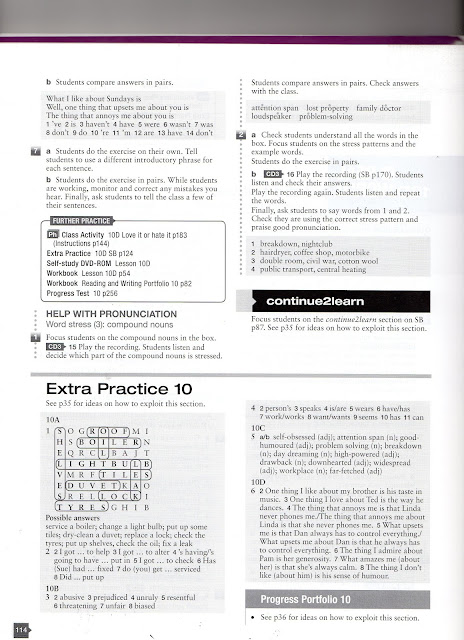Hello everyone.
This video isn't made for students, but a colleague of mine has prepared an activity sheet which has a glossary to help you.
Unit 8C
Difference between Men’s Brains and Women’s Brains:
An American comedian gives his “take” on the difference between men and women’s brain and the practical implications when they relate or live together.
Link to video:
https://www.youtube.com/watch?v=SZ6mVumHY9I
Before You Watch
1. Vocabulary The following words or expressions may be new :
· basement (n.) = bottom floor of a building; cellar
· particular ( adj.) = specific
· aware (adj.) = conscious or cognizant of
· subject (n.) = topic, theme
· wire (n.)= metal in the form of a thread or thin rod (alambre)
· upbringing (n.) = family teaching and training of a child; “educación” in the non-academic sense
· nun(n.) = religious sister in the Catholic church
· brain-dead ( adj.) = without any activity in the brain
· unwind ( v.) = relax, free one’s self of stress
· nuts ( adj. / coll.) = crazy
2. Think about the following points:
- Have you heard or read anything about the difference between men and women’s brains?
- Do you think that men and women are innately quite different in terms of the way we use our brains or do you think it’s mainly a question of individuals and the differences are exaggerated?
First Viewing
Now read the following sentences. Listen to determine which sentences are true of men, which are true of women and which are true for neither according to the comedian. Write M, W, or N.
1. Their brains are made of a big ball of wire. _____________
2. Their brains are made of little boxes that don’t touch each other. ________
3. Their brains are made of big boxes that connect with each other. _________
4. They close the little boxes of their brains very carefully. _______
5. Their brains are like internet super-highways driven by emotional energy. _______
6. Their brains are like race cars driven by sexual energy. ____________
7. They tend to remember everything. _________
8. They don’t care about many things. __________
9. Their favourite box is the “nothing box.” ________.
10. Their favourite box is the “people box.” _________.
11. Their minds never stop working. ________
12. They handle stress by not thinking or talking. _______
13. If they don’t talk when they have a problem, they will explode. _______
14. If you give them advice, they will become loving and appreciative. _____
15. They think that they are supposed to fix things. _________
16. When they are stressed, they have to do a physical activity. ____
Second Viewing Answer the following questions.
1. What is the main rule for men’s brains?
2. What are some things that most annoy men about women?
3. What kind of school did the comedian attend when he was young and what teacher does he remember?
4. According to the speaker, what happens when you connect an event to an emotion?
5. What thing about men most drives women crazy?
6. What are two “brain-dead” activities that men love to do?
7. What are 2 or 3 things men typically say to women?
8. What are 2 or 3 things that women typically say to men?
Language Focus
Complete using the gerund or the infinitive of the verb in parenthesis. If there is no verb, add a logical verb in the right form.
1. Men close their boxes ____________ (be) very careful ____________________ ( touch- neg.) any other box.
2. Women tend _____________ ( remember) everything.
3. Women’s brains never stop _________________. ( work)
4. Nothing makes a woman more irritated than ______________ ( see) a man______ nothing.
5. Men don’t understand that women just need ______________ about their problems.
6. They just want the men ____________________.
7. Men avoid ____________ when they have problems or are stressed.
8. They refuse ________ anyone come into their “nothing box.”


















